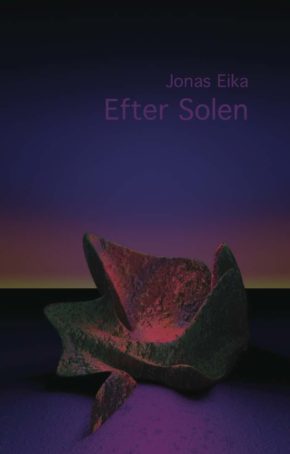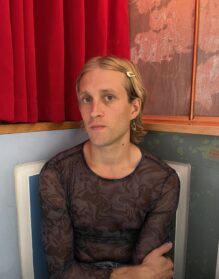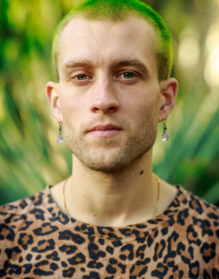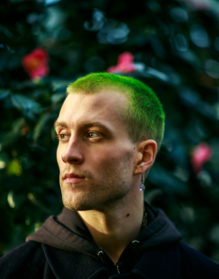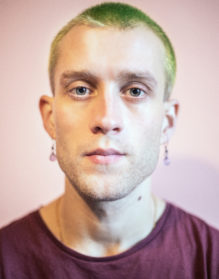Jonas Eika
Jonas Eika (1991) is a young writer in utter command of their craft who grabs hold of the reader with tender fury. They made their debut in 2015 with the novel Marie House Warehouse, which was awarded the Bodil og Jørgen Munch-Christensen’s Prize for emerging Danish writers in 2016.
Eika made a major splash when they were awarded the prestigious 2019 Nordic Council Literature Prize for their short story collection After the Sun and Eika’s divisive acceptance speech went viral.
After the Sun has been hailed around the world as a groundbreaking piece of literature, with notable releases in Germany, the US and UK. Eika is only the second Danish writer to ever have a work of fiction published by The New Yorker Magazine.
In 2022, After the Sun was longlisted for the International Booker Prize.
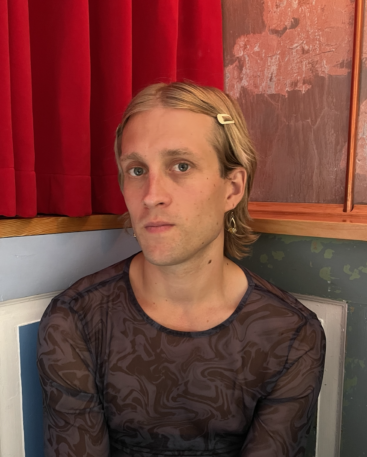
Reviews
“Relentlessly thrilling. Many lasting, vibrant scenes…It’s the language, too, that pierces, thrills. The sentences in these stories stretch past the limits of the ordinary to the luridly extraordinary, and some moments feel as if they are breaking through to the sublime…Whittling the complexity of financial markets into vibrant prose seems as difficult as it is necessary, if art is going to reckon with the way we live now. In another moment, both Kafkaesque and hyper-contemporary, prescient even, the narrator crawls into the ruins of the bank…Achievements of stylistic originality.”
The New York Times (US)
“Rare is the talent that corrals flawed characters and explosive politics into a sweeping, searing collection.”
Oprah Daily (US)
“After the Sun, by Danish writer Jonas Eika, reads a bit like Thomas Pynchon taking on late capitalism. The writing is surrealistic, granular in its details, and concerned with social entropy and desperate attempts at communion… In a translation of unsettling intensity by Sherilyn Nicolette Hellberg, the stories derive much of their force from their insistence on transformation. Not only do the settings and characters abruptly alter, as in a dream, but the mood can instantly switch from light to dark.”
The Wall Street Journal (US)
“The global reach of the stories underscores the universality of the alienation that these characters endure. And the surreal debris Eika evokes from the fallout of capitalism has its own resonance.”
Booklist (US)
“Eika’s ability to combine foreboding with magic realism generates excitement in this English-language debut.”
Library Journal (US)
“Dreamy, febrile and thoroughly twisted, After the Sun is a collection from an author who aims to confound perception through language and small distortions of reality…What you’re left with are impressions, feelings that break through and haunt you. A bold debut from an author who understands the generative capacity of fiction, After the Sun is a glimpse into our brutal world through Eika’s slanted gaze.”
The Seattle Times (US)
“They have written a book that both feels bleeding-edge now, and seems like it will still feel bleeding-edge in a decade…Searingly beautiful…breathtaking in the truest sense…Eika captures our modern moment perhaps better than any writer I’ve seen attempt to. Their understanding of the alienation felt deep at the heart of so many, and the abstracted and byzantine nature of the systems undergirding our detached lives is unparalleled. But most of all, in these stories Eika is able to realize the joy to be found, however fleetingly, in our shattered world.”
Chicago Review of Books (US)
“Five surreal, globe-spanning stories shape Eika’s startling English-language debut…Studded with shockingly visceral images, these lyrical stories are preoccupied with a sense of psychosexual loneliness that penetrates even the most absurd moments of escapism. […] Eika’s fusing of the magic realist mode with the alienation of modernity makes for a winning formula.”
Publishers Weekly (US)
“An urgent, deliriously discomforting reflection of how we’re all connected with one another — and what it is we expect in exchange for that kind of access. Eika holds nothing back in their fiction, they go into the tightest of spaces and most intimate and terrifying of moments in order to breakthrough to places few have been before — or even imagined existing.”
Refinery29 (US)
“A collection of surreal stories from a Danish wunderkind. This debut book brings together five strange, challenging works of fiction and has already won its 30-year-old author several Nordic literary awards. Difficult and mesmerizing, the stories range from formally formidable to downright mind-melting in their creative disregard for convention… It’s Eika’s ability to plunge readers headfirst into discomfort or even disgust and then prod for uncomfortable truths that elevates their brazenly weird fiction from crass pyrotechnics to legitimately rewarding puzzles. Utterly brilliant and occasionally confounding, these strange stories catch like fishhooks into the reader’s nervous system.”
Kirkus Reviews (US)
“This collection of five stories opens in eye-catching style, and never lets up. Jonas Eika, a prize winner in their homeland of Denmark, offers a presentation of the world that’s both oblique and garish. […] this is a book that is hard to get out of your head, like an extravagant dream.”
The Guardian (UK)
“Audacious… These stories are by turns lyrical and brutal, ultra-realistic and fantastical. They penetrate layers of life and experience in rhythms that are both full of music and full of horror, showing the reader an underside to our modern, globalised world.”
Lunate (UK)
“After the Sun confronts modernity and alienation in hypnotic prose… These stories are compelling, haunted, even radiant.”
TLS (UK)
“Whether it is young men caught up in the exploitative servility of the sun, sex and sand industry in ‘Bad Mexican Dog’, the self-intoxicating cynicism of the futures traders in ‘Alvin’, or the cosmic xenophobia of UFO enthusiasts in ‘Rachel, Nevada’, the writer is closely attuned to the ways in which only fiction can capture the strange fusion of sentimental fantasy and commercial brutality in our contemporary moment.”
The Irish Times (UK)
“Ground down by the transactional thrust of late capitalism, Eika’s characters rise through unearthly ritual: the dance of the unconscious, as those oppressed seek the uncanny, seek to transcend their surroundings and access their desires in a post-god world… Alienation is central, and expressed in language that has a psychic, prophetic beauty.”
Exacting Clam (UK)
“The five short stories that make up this collection are dizzying. […] By combining hyper realistic descriptions with fantastic and dreamlike motifs, the writer, born in 1991 and a winner of numerous awards, creates a disturbing atmosphere: that of a world without landmarks nor anchoring, where the individuals, derealized, are no longer more than the sum of the links, more or less ephemeral, which are formed between them.”
Le Monde (FR)
“Computer chips, clones, UFO:s, synthetic drugs, bizarre cults and ceremonies, déjà vu, trips and trips, body horror, oiled tourists and beach boys at you service… There is some Cronenberg (father and son) to this collection by a young Danish author (born in 1991) where the short stories seem to blend into each other and where we sleepwalk from Copenhagen to Cancün, passing through Nevada. […] Because how can we still write stories that hold in a world burned by capitalism, dehumanization, digitalization? By taking advantage of the last rays while searching for other lights: ‘We make the best of what exists’.”
Libération (FR)
“The young Danish author Jonas Eika completely destroys every safety net: their book After the Sun has a combustible power in its longing for another world – and it expands the term ‘fiction’. No other poet has exploded onto the scene like Eika in a long while.”
Der Spiegel (DE)
“This is a slim book, 150 pages thin, but the stories contained within are so dense and magical that you are left feeling as if you have just woken up from a visually powerful dream. […] The biggest feat of the Danish author Jonas Eika is the way in which they tell their stories so crystal clear, only to have them slowly sink into the mystic and surreal.”
SWR2 (DE)
“Eika’s stories can be read as political. At the same time, they are both more subtle and more powerful than most political literature being published today.”
Neues Deutschland (DE)
“And it is right here, in the perceivably unrealistic state somewhere in between collective hallucination and supernatural happening, that the political potential of the stories reveals itself: Just as the writer and their characters are building aesthetic other worlds out of every-day life, it can also be possible to work this material from our own reality.”
Saarländischer Rundfunk (DE)
“The astonishing thing is how Jonas Eika manages to give a political angle to their literature and, from this, an expansive, flickering and self-destructive attack on the European middle-class is developed. Jonas Eika attacks the very personality of the modern west-European.”
MDR Kultur (DE)
“In their stories, the new Danish literary star Jonas Eika finds the sound of our fading present. […] Jonas Eika pulls off writing prose that condenses political and economic questions at the same time as it portrays a disintegrating physicality and a limit-defying sexuality.”
FAS (DE)
“Jonas Eika spares no-one in their always good, yet disturbing book, because Eika’s characters are only likeable under strong reservations of sympathy. Despite the deep-frozen attempts at maintaining distance, which leaves a metallic aftertaste, they still keep you under their spell. Can this crazy Shockdown-world which Eika is describing really be our own? And how much after-sun (or as they say in the lyric: Nachsonne) would we need until all of our burnt skin has healed again?”
TAZ (DE)
“The prose of Jonas Eika is full of liveliness, vitality, brightness, color, variation. […] For me, this is a writer and a book that corresponds with our time.”
ORF (DE)
“This book had me from the very first sentence. […] This amalgamation of people, animals and realms of time… Jonas Eika translates all of it into remarkable prose. I’ve never read something else like it, in such a wonderfully poetic and convincing translation.”
ORF (DE)
“The linguistic precision of Eika’s work is deeply impressive. The motif of dissolution is translated in an ingenious way; dissolution, through letting sentences disintegrate without seeming too arbitrary or deliberate, but rather overtly constructed. It is realistic and surreal – with Eika, the two do not contradict each other.”
ORF (DE)
“An unusually expressive literary voice with an independent style. […] Eika shines with their imagination and empathy.”
Darmstädter Echo (DE)
“Visionary tales that do without the sci-fi costume, tales that know (too) much about the world and sobering, disturbing and disgusting things. […] Jonas Eika writes oddly fantastical stories the likes of which have never been read before.”
NZZ AM Sonntag (DE)
“The language of Eika is as volatile as their characters. It’s exciting to see how they dress their bio-political questions in radical poetry.”
Profil (DE)
“Eika gives voice to characters that are truly rare to hear, while showcasing the many devastating effects of capitalism. Immensely clear, precise language with strong imagery that is deeply mystical.”
DLF Kultur (DE)
“The stories of the young Dane Jonas Eika are both cosmopolitan and phantasmagoric. […] Even the first few sentences create a shimmery realism which draws the reader in, only to then engulf them in a hypersonic network, a network which makes 5G seem old. To read Jonas Eika is like seeing a weird, translucent organism breathe. From the inside.”
Die Zeit (DE)
“Disturbingly good.”
RBB Inforadio (DE)
“Everything in After the Sun is flickering and shining, taking shape and losing it again: the sun visor, the sunbeds, the bodies, the words. It is so much more than esoteric mind-games or a simple language experiment – if you take Eika’s writing to heart it might be the only possible writing in the Anthropocene.”
Tagesspiegel (DE)
“Jonas Eika is enchanting their readers […]. The stories of the young Dane Jonas Eika discuss inner travel and longing that removes the protagonists from the cold, crass reality.”
Stern (DE)
“The Danish shooting star Jonas Eika give a completely new voice for the storytelling of the future. In their short story collection After the Sun, they undo all physical boundaries.”
Süddeutsche Zeitung (DE)
“Spectacular […]. The stories read as sensual as they are cryptic, permeated with a heavy desire that can barely be distinguished from a spiritual longing.”
Der Tagesspiegel (DE)
“Genius […]. To read Jonas Eika is to see a weird, transparent organism breathe. […] A shooting star from the heart of the craft. How wild fantasy and extraordinary language consciousness combine with radiant artisanship is truly impressive.”
Zeit Online (DE)
“The stories in Jonas Eikas’ short story collection After the Sun are mysterious, apocalyptic and full of magic.”
Wetterauer Zeitung (DE)
“Maybe the best short story collection of 2020.”
Deutschlandfunk Nova (DE)
“Calmly and with a rhythm that sets the characters off course, Eika shows the multiplicity of realties whose perspectives are rarely heard in literary terms.”
Deutschlandfunk Kultur (DE)
“Completely in love.”
Kultunews (DE)
“Eika’s language is literally dripping with sweat, perfume, blood, sperm, after-sun and water. The five stories in ‘Efter Solen’ – the original title – convey the shimmering feeling of finding something better in a worrisome future.”
Die Rheinpfalz (DE)
“‘What the fuck?!’ That is what you think over and over again while reading the engaging Eika. And, ‘Did they really write that, or did I get too much sun?’”
TAZ (DE)
“After the Sun is a wild and clever plea for unruliness. Drawing inspiration from Simone Weil and Clarice Lispector, After the Sun is a mystical book of ideas. Eika urges you to seek a twilight zone, because why not flirt with the mystical today? A gem.”
De Standaard, 5/5 Stars (NL)
“The young Danish author Jonas Eika […] seizes you from the first pages in their collection After the Sun with their almost physical, exciting style. […] Ingenious and intriguing prose which breaks free from its shackles.”
De Morgen (NL)
“There is something in the Danish water. It tastes sweet and sick and smells like money and death. It is anarchist, anti-capitalist, and concerned about the end of the world as we know it. It is queer, fluid, and amorphous and cannot be trapped in boxes or structures. […] In After the Sun, we are presented with four vignettes from a near future. Every vignette highlights a different segment of this deteriorating world. While we are in the opening story Alvin still mocking the ruling financial class, we do in Rory, Aurora and I find ourselves among the drug-addicted rabble trying to make ends meet. Further, the man, with his desire for recognition and affection, is always put up against the system that denies him these things and is only interested in maximizing profit. […] It also becomes interesting when the perspective suddenly turns to one of the tourists and a power play arises between the oppressor and the oppressed.”
Tzum (NL)
“The execution is ruthlessly good, energetic and original!”
Stavanger Aftenblad (NO)
“There is no doubt that Jonas Eika is a highly talented literary author who combines genre-bending with political activism and social criticism.”
VG (NO)
“You might as well take note of the name right away: Jonas Eika.”
Marta Norheim, NRK (NO)
“It feels almost unworthy to be so madly in love with a book when it itself is mysterious, clever and cool – but I don’t want to play any games. After the Sun is the best I’ve read this year and I want us to talk about it in depth, so everyone else has to read it too.”
Weekendavisen (NO)
“Eika’s short story collection explores the desire to belong, as the short stories shape and take form. Every single one of the stories dwell on this pre-political stage, filled with lost and seeking people who – it is easy to imagine – ideological groups from all along the spectrum might have recruited soldiers from. The stories become short intellectual experiments while conducting sociological research in a literary form.”
Ragnild Lome, Vagant (NO)
“After the Sun created images in my mind that are impossible to get rid of. […] Eika understands the discomfort they put privileged readers through when they direct a bright light on problematic structures in society.”
Klassekampen (NO)
“A bold and propitious choice. The Nordic Council Literature Prize has often been awarded to veterans and retrospective novels. Jonas Eika is unpredictable in both their esthetics and social analysis.”
Aftenposten (NO)
“It’s a fantastic well written short story collection, that leaves the reader with an alternative view on the world around you and a feeling of readmission. Through Eika’s expressive language a discourse is established with an everlasting connection between the past, present and future. This alternative time loop creates a unique reading experience and it’s a journey I highly recommend.”
Littuna (NO)
“A singular world arises, a world of religious mysticism, gay sex, och sweet poetry. A world that I long to visit again.”
Sveriges Radio (SE)
“Eika creates an entirely fictional room – a room that is as foreign to us as every person outside ourselves is foreign to us – and invites us inside. […] Eika’s focus always remains on the individual person, he or she who survives whatever has raged through her life and closed off all roads to a tolerable future. He or she who survives not to take her revenge or to make it out better than anyone else (according to a somewhat stale Hollywood convention), but rather because that is all that remains. To survive. […] The world belongs to those who truly live in it. That is the moral of the story. That is powerful.”
Dagens Nyheter (SE)
“The dark mood – of a divided society that has proven itself unviable – is what I will carry with me. […] This is all probably highly deliberate, an ambition of the author to make me think and understand more than feel and believe.”
Kristianstadsbladet (SE)
“Eika likes to twist reality a bit, even if they don’t directly distort it. This is further highlighted through a sensuous and highly visceral and expressive language, where the intense sense of presence in the text is palpable. For me, Jonas Eika is a very cool new discovery. After the Sun is an unusual – odd, even – short story collection, where each and every story is well worth the read.”
Norra Skåne (SE)
“Eika does not linger in the filth of realism; they work with an element of the fantastical that is reminiscent of Lotta Lotass, who also sought out the dark side of the American dream. […] Eika’s stories play out in a colonized world, populated by those who rule and those who are ruled, by creatures on the margin. And the book’s final lines allow the world to ‘glow in a mild orange light’: a light of hope or of the apocalypse – which one it is, the text does not reveal.”
Expressen (SE)
“Jonas Eika is a rare literary talent with true sensibility, who does not need to flex their ‘language muscles’ in order to be immediately convincing and striking.”
Västerbotten-Kuriren (SE)
“I’m fascinated by how the author has created all these distinct narrators, all with their own voice and willpower. […] This short story collection is in many ways complex in both its subject and form. The mood is almost tangible, and laid the foundation for my entire reading experience. […] After rain comes sunshine. After the Sun comes sweat and exhaustion. Maybe, above all, the feeling of being alive.”
Kultmagasin (SE)
“The story collection After the Sun is sickeningly on point stylistically; this is blinding literature. […] After reading, the stories are as difficult to shake as evil och particularly significant dreams; they stick to your backbone like fear or sorrow. […] There is so much to love about this book and yet the things that make it lovable are also what make it almost unbearable to read. At the same time, the literary brilliance offers little shock waves of joy coursing through your body – Eika’s stories are like relatives of those in Andrzej Tichý’s recently published Purity: they are shows of equally wild, windingly long and maddeningly stylistic brilliance. [….] Eika’s prose moves into your bones and expands your senses in the way that only dazzling literature can.”
Göteborgs-Posten (SE)
“Eika is an author who writes with their eyes, registering every detail and the smallest of movements. It’s a pleasure to read their writing, a challenge for the mind and the senses: I don’t always know what I am experiencing, but I don’t want to miss a single word of it.”
SVT (SE)
“Eika’s prose has a cinematic quality. […] The stories in After the Sun consistently give voice to those who finds themselves in the margin and who, in different ways, are defined by a loss and an inability to take their fate into their own hands – even when they try. […] At its best, Eika’s prose works like the drug they invent in one of the stories, that ‘activates an alternative nervous system’ in the reader. And, in case it isn’t clear, that is a very good review.”
Aftonbladet (SE)
“Eika’s prose is luminous and hyper-realistic, as though the worlds they describe are consistently being viewed through an ultra-violet filter.”
Hela Gotland (SE)
“To capture and frame particular occurrences in unexpected forms (grotesque, irrational, etc) is the way I think literature has the possibility to awaken, if not change, something in the reader. And Eika’s stories have that ambition. The winding route of fiction, that moves through the fantastical and grotesque, has in these stories been used to shed light on social phenomena.”
Kulturen (SE)
“An ambitious take on what it means to write ‘realistically’ in a time and place structured by a massive global economy, looking towards a future that, in many ominous ways, is already here.”
Jyllands-Posten (DK)
“After the Sun is only Jonas Eika’s second book, and it’s almost incomprehensible how improbably accurate and vivid it is… Eika’s stories revolve around a grumbling dark and directionless desire, which is suddenly let loose and given shape. Eika recounts tender and intimate relationships, which are simultaneously not sexual, so much more than sexual, and nothing but sexual. [These] relationships are unmistakably queer, arising between men, between groups of people, and between everything that exceeds the human.”
Information (DK)
“Jonas Eika’s prose in After the Sun is muted and unpretentious, but their landscapes, characters, and universes are brimming with strange sensations and presences, eerily mesmerizing and mysterious.This is a work of apocalyptic science fiction with a underlying tone of realism. The book is an extraordinary example of why this genre shouldn’t be underestimated as a literary form, and why it might be especially relevant in our time of ‘fake news.’ After the Sun is a fantastically strong follow-up to Eika’s provocative debut. Their stories express many disturbing aspects of being human and of the world around us.They are never sensational, but ceaselessly entertaining.”
The Danish Arts Foundation (DK)
“Jonas Eika’s dreamlike short stories broaden the reality of the reader and reflects on power and marginality. In the Danish author’s short stories, the boundaries between the self and the world disappear, and the world flows unobstructed into the individuals’ consciousness. A radically open mind reveals both the social balance of power and the seeds of solidarity. […] Eika’s surreal expression is neither hallucinatory nor delusional, instead showing the utmost absurdity in ordinary phenomena, relationships and settings.”
Voima (FI)
“The winner of the 2019 Nordic Council Literature Prize is a young author whose collection of short stories After the Sun has surprised and enthralled the jury with its global perspective, its sensual and imaginative language, and its ability to speak about contemporary political challenges without the reader feeling in any way directed to a certain place. Eika writes about a recognizable reality, regardless of whether we’re in Copenhagen, Mexico, or Nevada, and whether we’re among financial speculators, homeless boys, or people who believe in aliens. There is a real sense of poetic magic. Reality opens into other possibilities; other dimensions. There is something wonderful and hopeful in it that reminds us how literature can do more than just mirror what we already know.”
The Jury of the Nordic Council Literature Prize
Books
Press Images
Awards
2023 – Awarded the O. Henry Prize
2022 – Longlisted for the International Booker Prize for After the Sun
2022 – Longlisted for the Republic of Consciousness Prize for After the Sun
2019 – Awarded the Nordic Council Literature Prize for After the Sun
2019 – Awarded the Montana Literature Prize for After the Sun
2019 – Awarded the Blixen Prize for After the Sun
2018 – Awarded the Michael Strunge Prize for After the Sun
2018 – Nominated for the Danish Critics Prize for After the Sun
2016 – Awarded the Bodil & Jørgen Munch-Christensen’s Prize for Marie House Warehouse
